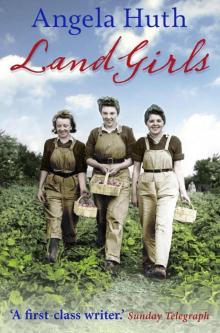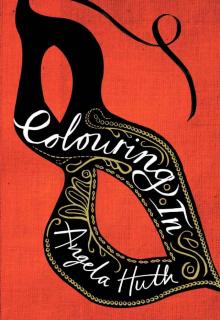- Home
- Angela Huth
Monday Lunch in Fairyland and Other Stories
Monday Lunch in Fairyland and Other Stories Read online
Monday Lunch in Fairyland And other stories
Angela Huth
Contents
Acknowledgments
Perdita, Twice
Loaf
Consequences
Thinnest Ice
The Friend
Monday Lunch in Fairyland
Dirty Old Man
Maternity
Mind of her Own
Loving Gourmets
The Fall
Azaleas for Sale
Up-State New Jersey
The Outing
Deception is so Easy
Last Love
Perdita, Twice
Lawrence made an emphatic decision, in February, never to see Perdita again. In May he decided, with equal determination, to put an end to the whole absurd plan.
He rang her one afternoon. She wouldn’t be doing anything, he thought. Just frittering away the hours, as she always did after lunch. She was hopeless at afternoons. They weren’t her time of day. They depressed her. He was positive she’d be there. She was.
‘Hello, Panther.’
‘Oh, hello.’ Not for anything would she let herself sound surprised, Lawrence realised, with some admiration. ‘Hang on. I’m eating something.’ He hung on. ‘I thought you weren’t going to ring any more.’
‘I wasn’t.’
‘Oh, well, now you have.’
Lawrence paused. Then he asked her what she was eating.
‘A biscuit thing made out of sesame seeds. I found them in a health shop last week. Not fattening. Much better for you than ordinary sweets. Was it February we last spoke?’
‘Yes. The seventeenth.’
‘So it was.’ She was silent again. Lawrence asked her what she was wearing. Before, this had been a sign between them that if one asked the other on the telephone what he was wearing, it showed that the asker wasn’t cross any more.
‘Purple boots and an old skirt. You don’t know them.’ She laughed slightly.
‘Is your hair the same?’
‘Longer. Where are you?’
‘At the office.’
‘Work going all right?’
‘Fine. Fantastic’
‘Eugenie all right?’ She pronounced the name very carefully.
‘Fine, too.’
‘That’s good.’
Lawrence’s secretary came in and reminded him by signs that he should be at a meeting.
‘When shall I see you?’ he asked Perdita. Punctilious about time, the thought of the meeting confused him. Instead of thinking up a good way to put the question to her, he bungled it in his hurry.
‘Meet?’ She sounded genuinely surprised.
‘Why not?’
‘Do you really want to?’
‘Of course. Otherwise I wouldn’t be ringing.’
‘You won’t get at me, will you?’
‘I won’t get at you.’
‘All right, then. Saturday afternoon. How would that be?’
He loved her for that. Once she’d made up her mind about anything, she got on with the practicalities. He thought about Saturday afternoon.
‘That should be all right. Eugenie’s doing something with the children. I don’t think I’m expected.’
‘Two-thirty, then. Usual place.’
‘Wait in the car for me.’ For a split second he hesitated, trying not to ask the next question. But he couldn’t resist. ‘I forgot to ask: how’s Oliver?’
‘You didn’t forget. He’s very well, working like the devil. Expanding.’
She laughed again and put down the telephone. She never had learnt to say goodbye.
Saturday afternoon: drizzle but a bright sky. The leaves on the trees seemed frizzy in the rain, almost a vulgar green against the clouds. Lawrence, half an hour early, stopped by the familiar pillar box, turned on the sports news and began the Times crossword.
Perdita arrived ten minutes late, parked her red Mini two feet away from the opposite kerb, and ran to Lawrence’s car. He let her in quickly. Even in the short dash across the street her hair was misted with raindrops, and her cheeks shone. Lawrence kissed one of them, smudging the wet as he did so.
‘You smell of Irish stew and bittermints,’ he said.
‘You know it’s the only thing I can cook.’
‘Oliver like it?’
‘Very much, luckily.’ They both laughed. Lawrence started up the engine without asking her where they should go. Perdita crossed her hands on her knees and looked at his profile. ‘Why did you ring me?’ she asked.
‘I don’t know. I thought we might as well remain friendly.’
‘Quite.’
Ten minutes later he said:
‘I’ve found a very good new wholesale place for wine.’
‘What, you mean better than that place, what was its name, where we used –?’
‘Much better. I’ll give you the address, if you’d like me to.’
‘That would be useful. Although, actually, Oliver gets all our wine from Christie’s. I think he enjoys the sales.’ Our wine, she said.
‘Does he, indeed? I wouldn’t have thought he had the time.’
‘Well, he makes it.’
‘But you said he was expanding.’
‘He is.’
‘In which direction?’
‘Oh Lawrence, shut up.’ She giggled.
‘I’ll keep the wine place to myself, then.’
He stopped the car in a clearing in the park reserved especially for cars. Before them was a litter bin, the mild slopes of grey grass, and shaggy trees smudgy as fingerprints, dull in the rain.
‘We may as well get out,’ Lawrence said.
‘What, in this?’ She was already half out of the car, eager to please, to show that small things like rain didn’t finally matter when it came to the test. Lawrence took her arm.
‘It’s terrible, this sort of place, on a Saturday. I liked Saturdays at Oxnead.’ They’d once had a cottage at Oxnead.
‘So did I. All that cow parsley in the garden, about this time of year. It was lovely, even when you came down so late on Fridays.’
‘Actually, you hated it.’
‘I didn’t.’
‘You did, you know. At the time.’
‘Well, anyway, in retrospect I liked it more than I didn’t like it. Don’t let’s argue.’
Lawrence kicked at a bit of tinfoil shining in the grass.
‘The mess. I’m going to join some anti-litter committee. Eugenie does a lot for the pollution people.’
‘Does she?’ Perdita smiled a little to herself. ‘And does she help you out at all with your work?’
‘Well, she couldn’t really, could she? She doesn’t know anything about it.’
‘What does she do?’
‘She has a very full life. She’s very efficient. Looks after me bloody well. Cooks beautifully, runs everything, thinks up surprises . . .’
‘How nice for you,’ said Perdita, quietly, without sarcasm. Then she added, ‘Luckily for me, Oliver loves me for all the things I can’t do as well as the things I can. I no longer surprise him in any way. He just accepts me. Sometimes, it’s almost as irritating to be accepted by him as it was always to be queried by you.’
‘I’m sorry. But I expect it’s better that way.’
‘I expect so.’
They held hands and began to run, Perdita a little behind Lawrence, puffing, complaining of a stitch; Lawrence saying nonsense, she shouldn’t be so unfit; the rain slanting blearily across their eyes. He stopped at last under a tree, let Perdita cling to him, laughing, her head on his shoulder, while he kissed her damp hair, saying you silly fat one and all the thing
s he used to say. But soon she was drawing back and looking at her watch.
‘I must go. Oliver’ll be back. I have to get tea for the children.’
‘As a matter of fact,’ said Lawrence, ‘Eugenie will be getting back too, expecting me.’ He took Perdita’s arm and they began to retrace their steps. ‘Now if it had been you and me, Panther, we could have relied on the other one to make our own toast.’
‘Of course.’ She laughed: once she had started laughing almost anything he said she would respond to with this familiar, infectious laugh which he had first loved her for.
He drove fast back to London – this was the only difference, this not having all the time in the world – and back at the pillar box, in the steamy car, he said:
‘That rocking horse we bought in Bath – it’s still in my attic. I must arrange to get it over to you.’
‘So you must,’ said Perdita.
‘We could meet and discuss it.’
‘Breakfast Wednesday, then. The Connaught.’
‘That’s as good a place as any,’ he said, ‘to discuss a rocking horse.’
He rang her up every day after that, missing her, suddenly. Once, one afternoon, she rang him. She’d never admit she missed anyone. She merely said she wanted someone to make her laugh. Any of their old jokes would do. And they did.
At breakfast, though, they got off on the wrong foot from the start. Lawrence was late because he overslept – having stayed awake most of the night in order not to over-sleep – and Perdita hated to be kept waiting. She snapped at him and wasn’t amused by his excuses, nor mellowed by his apologies. She was an unfeeling bitch, sometimes, Lawrence remembered. This sort of scene brought it back to him. Funny how, remembering her, this side of her character always evaporated. It was the laugh, the gayness, the slightly wicked observations, the warmth of her that remained.
But halfway through the kippers an elderly man they both knew came into the restaurant. He nodded as he passed them by a look of happy conspiracy in his baggy old eyes.
‘Think he’ll say anything?’ whispered Perdita. She loved illicit, or semi-illicit situations.
‘I think not,’ said Lawrence. ‘He’s known to be discreet. Anyhow, why should we hide? What’s there to be ashamed of?’
‘Only the past,’ said Perdita.
The presence of the old man brought them together again. They mentioned neither Oliver nor Eugenie, and talked gaily only of themselves. They didn’t leave till ten, elated, springily, laughingly wondering whether it was wise to meet again, and knowing that they would.
That very afternoon Perdita rang Lawrence at the office. He knew something had happened. She was using her flat voice.
‘It’s Oliver’s divorce,’ she said, after a few irrelevant preliminaries. ‘It’s suddenly come through much quicker than we expected.’
‘That’s good,’ Lawrence heard himself saying. ‘Funnily enough, Eugenie’s should be through fairly shortly, too.’
A long silence. Then Perdita said, at last:
‘So I suppose that means we should get on and do something about ours.’
‘Of course,’ said Lawrence. ‘I’m afraid my solicitor hasn’t been hurrying.’ He paused for a while, then went on: ‘It’s funny about timing, Panther, isn’t it? I mean, we knew the divorces were coming up, all three of them. We were sticking to what we’d decided to do, happy about it and all that. It’s just that, well, I was rather enjoying having an affair with my wife.’ With a very sharp pencil he dug a pattern of dots on to his clean blotting paper. He heard Perdita sniff, or choke or something. ‘Don’t be silly,’ he said.
‘Sorry,’ she said at last, absolutely controlled, ludicrously gay, even managing a laugh. Then, for the first time he could ever remember, she said goodbye.
Loaf
Afternoons like this, Loaf hated. Afternoons like this he’d like to be up in the hills with his stick, bashing at the brambles or lying in the shade chewing a bit of gum. A man shouldn’t have to work in this heat. Especially as there wasn’t even any sun: just grey, dull, sultry heat so you could almost touch the stickiness in the air, and there was nowhere you could get away from it, no shady places.
Loaf sat on a bale of straw in the barn. His big legs in their khaki dungarees were slung apart to support a saddle. He polished its dark leather with an almost defiant feebleness, his big head hanging to one side, small strange eyes staring at the shining reflections that emerged, as he rubbed, from the dull surface. At his feet a couple of brown hens scratched at clumps of clover. Their silly clucking annoyed Loaf, a little, as it always did. Though once when his mother had taken him into the town for the day, a dreadful day with a tie round his neck and carrying paper bags of women’s shopping, he’d said on the train coming back, ‘I missed those bloody hens.’ Now he said, ‘Mind out, you pretty buggers,’ and gave them a kick with one of his big, slow feet
He didn’t hit them but they squawked in their daft fashion and raised their wings, as if any such pathetic gesture could help lift their plump bodies out of Loaf’s way. He looked up to see Gracie standing up at the barn door, lolling as usual, still in her school uniform.
‘You hurt them and Pa’ll go out of his mind,’ she said.
‘Ah,’ said Loaf. Gracie with her airs and graces – he’d teach her one day.
‘Tea’s on,’ Gracie added. ‘But I should finish that saddle if I was you.’
‘’Tis finished.’ Loaf put the saddle on the ground and stood up, newly conscious, as he was many times a day, of his own massive height. He looked far down at Gracie. She was small for fourteen, but had lovely breasts beneath her schoolgirl shirt, anyone could see that, and spindly legs under her short skirt. She gave him a funny look, challenging, like she often did, and pouted her pretty mouth.
‘Come on, then,’ she said, ‘you got to have a bath tonight.’
Loaf followed her to the house, remembering. It was tonight he’d promised to go with her – well, been forced to promise by his parents. The thought of it made him roll his shoulders, and feel the huge wet patches under the arms of his shirt. He’d give anything, anything not to have to go. But there was no getting out of it now. For a week, since the suggestion had been made, he’d been wracking his brain for some idea that would release him from the ordeal. But nothing had come to him and all the thinking had made him slow and clumsy. Pa had been sharp with him several times, and threatened to send him to work on a neighbouring farm.
At tea Gracie was all excitement but still managed to get through a large amount. Loaf pushed his own plate of eggs and sausages away. He felt sick enough already.
‘Eat up,’ said his mother. ‘I’ve no patience with poor eaters wasting good food.’ She was skinny as wire herself, never ate a thing.
‘Be glad when tonight’s over and Loaf’s back to his normal brilliant self,’ said Pa. ‘Done a good job on the saddle, have you?’
‘Done a good job, Pa.’
‘Hung it up?’ There was a long silence.
‘Well, I was going to,’ said Loaf.
‘It’s on the floor,’ said Gracie. ‘Quite safe,’ she added. Another silence.
‘There’s no call for tell-tales,’ snapped her mother, taking away Loaf’s plate of unfinished food. Gracie pouted.
‘I only said because I knew Pa’d do his nut if it stayed there all night, and Loaf might forget, all the excitement.’
‘You’ll hang it up right after tea, Loaf,’ said Pa.
‘He’s got to have his bath,’ said his wife.
‘He’ll have his bath after he’s hung up that saddle or he’ll not be going to the dance.’
New hope leapt within Loaf. Gracie wailed.
‘Shut up that noise,’ snapped her mother. ‘Loaf 11 hang the saddle up then have his bath.’ In the end, Mother always had the final word. She ran her hand through her son’s short hair.
‘And get that hay out of your head and put on some of Pa’s grease.’
Loaf knew better than t
o protest. When his family wanted to do something they had their ways and means. They had quick tongues and a flow of words that always beat him. In his head, he could argue against them: in his head he was just as brilliant as they were, full of convincing arguments on his own behalf which, had he been able to articulate them, would no doubt have won them over. But getting over his own point of view was the trouble: translating thoughts to words was not a talent he possessed. All his life the easy spinning of words had eluded him, leaving him stranded, unable even to shout for help. And other people, even his family, in all their busy going back and forth, had little time for his predicament.
He had a bath and dressed himself in his only suit of baggy grey flannel. With it he put on a white nylon shirt and a plain blue tie, and greased down all but the most impossible spokes of his hair. Then he hung about in the kitchen, feeling more enormous than usual, waiting for Gracie.
When at last she arrived he understood why she’d been so long. She’d done something to herself, all right. She looked terrific, pirouetting about, aware in every fibre of her body of her own attraction.
‘Like it?’ She looked down at the bouncy pink skirt jumping about her legs as she moved, the neck of the jersey scooped out so that her breasts bulged above it. Her hair moved and shone: she had thickened her long eyelashes with black mascara and greased her pouty lips. Only her legs seemed frail and childlike: almost sad, their spindliness, Loaf thought. Weren’t the ugly clumpy shoes too heavy for them?
‘Oh yes,’ he said, dully, because he was still thinking of her poor legs having to bear the weight of those shoes.
‘Smashing,’ said Pa, smiling. Gracie could always make Pa smile.
‘And do hold your head up, Loaf,’ said Gracie.
‘Yes, chin up, Loaf,’ said Pa. ‘You’ve a sister to be proud of tonight.’
Loaf raised his head. His hair touched the beams of the ceiling. He tried to smile at Gracie, but she was frowning at him now.
‘Couldn’t you have worn anything more – you know?’ she asked.
Loaf felt his heart quicken. He didn’t much like Gracie, most of the time, but he didn’t like to disappoint her, either. He didn’t understand. Mother had gone to great pains to choose his clothes for the evening: she’d been pressing and brushing all afternoon.

 Sun Child
Sun Child South of the Lights
South of the Lights Virginia Fly is Drowning
Virginia Fly is Drowning Of Love and Slaughter
Of Love and Slaughter Such Visitors
Such Visitors Once a Land Girl
Once a Land Girl Land Girls
Land Girls Colouring In
Colouring In Nowhere Girl
Nowhere Girl Monday Lunch in Fairyland and Other Stories
Monday Lunch in Fairyland and Other Stories Another Kind of Cinderella and Other Stories
Another Kind of Cinderella and Other Stories Invitation to the Married Life
Invitation to the Married Life Easy Silence
Easy Silence